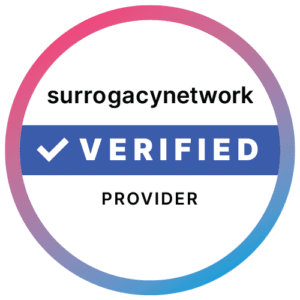Gestational surrogacy has emerged as a transformative option for intended parents struggling with infertility or other medical conditions that prevent pregnancy. However, like any complex process, gestational surrogacy comes with certain eligibility criteria and disqualifiers to ensure the safety and well-being of surrogates, intended parents, and the baby. In this blog post, we’ll dive into the disqualifying factors that potential gestational surrogates should know before embarking on this life-changing journey.
1. Age and Health
One of the primary disqualifiers for gestational surrogacy is age. Agencies and clinics require potential surrogates to be between a certain age range, often around 21 to 40 years old. This age range is chosen to minimize the health risks associated with pregnancy and childbirth. As women age, there is an increased risk of miscarriage and preeclampsia – a dangerous medical condition marked by high blood pressure, swelling, headaches, blurred vision – premature birth, and gestational diabetes.
Surrogates should be in good overall health, free from chronic medical conditions that could complicate the pregnancy. Conditions that are deemed high-risk or medications that are unsafe to take during pregnancy immediately disqualify a gestational carrier candidate. Some examples are:
- High Blood Pressure
- Diabetes
- Epilepsy
- Heart or Blood Disorders
- Severe Asthma
Being underweight or significantly overweight is also an immediate disqualifier. A potential surrogate’s BMI should be between 18.5 and 32. Those wishing to become surrogates outside of this range will either need to gain or lose weight due to the associated medical complications that can arise, including the risk of miscarriage.
2. Previous Pregnancy & Complications
Gestational carrier candidates must have a history of complication-free pregnancy and live birth in order to qualify to become a surrogate. While having at least one successful past pregnancy is required, having more than 5 (and more than two c-sections) will also disqualify a candidate, as many pregnancies increase the risk of uterine rupture.
Women who have experienced certain pregnancy complications in the past may be disqualified from becoming gestational surrogates. Complications such as preeclampsia, insulin-dependent gestational diabetes, or repeated miscarriages raise concerns about the surrogate’s ability to carry a pregnancy to term without posing significant risks to herself or the baby.
3. Substance Use and Lifestyle
Surrogacy agencies conduct thorough background checks to ensure the potential surrogate’s lifestyle is conducive to a healthy pregnancy. Substance use, including smoking and illicit drug use, can be disqualifying factors, as well as alcohol dependence and eating disorders. Smoking and taking hormones during an IVF cycle increases the risk of deadly blood clots. Prior smokers and those having recovered from eating disorders will be considered but subject to additional screening and must show at least six months smoke and relapse-free. A surrogate must be committed to maintaining a healthy lifestyle before embryo transfer and throughout the pregnancy.
4. Mental and Emotional Health
The emotional and mental well-being of the surrogate is of utmost importance. Women with a history of certain mental health conditions, such as severe depression or anxiety disorders, might be disqualified due to the potential impact of these conditions on the pregnancy and the surrogate’s ability to manage the emotional aspects of the process. During the screening process, surrogate candidates will undergo very extensive psychological testing. Here are just a few of the screening qualifiers:
- A selfless commitment to becoming a gestational surrogate – the desire is not primarily financially motivated or coerced.
- No history of bipolar disorder
- Evidence of treatment received and resolution of prior mental health disorders
- Ability to perceive and understand the perspective of others
- Evidence of emotional ability to separate from/surrender the baby at birth
Past severe postpartum depression and/or psychosis is an absolute disqualification. The recurrence risks are high, given the amount of hormones taken and the unique nature of surrogacy.
5. Legal and Criminal Background
Surrogacy involves intricate legal processes and contracts. Not only will surrogates undergo a thorough medical, psychological, and background screening, but anyone over the age of 18 living in the same home as the potential gestational carrier will, too. Surrogates, their partners, adult children, etc., with prior felony convictions, open legal matters, or unresolved child custody issues can disqualify a surrogate candidate due to the potential complications these issues could pose during the surrogacy journey. For example, a recent bankruptcy causes concern related to the motivation to serve as a surrogate. A currently pending divorce is not a disqualifier, per se. However, the divorce must be finalized before proceeding, as spouses must sign surrogacy contracts before the journey starts.
6. Lack of Support
“It takes a village” doesn’t just apply to raising a child. It also applies to the surrogacy journey. Gestational surrogacy requires a strong support system, both emotionally and physically. Surrogates without a solid network of friends and family to help them through the process might be disqualified.
As mentioned before, spouses/partners and adults living in the same home must comply with screening and demonstrate their support – both emotional and physical – and have no history of domestic violence, emotional instability, criminal history, or present any signs of disapproval, coercion, or financial-motivation.
Conclusion
Gestational surrogacy offers a remarkable path to parenthood for individuals who can’t conceive naturally. However, strict disqualifiers are in place to safeguard the health and well-being of all parties involved. If you’re considering becoming a gestational surrogate, it’s essential to understand these disqualifying factors and ensure you meet the necessary criteria before embarking on this profound journey. Always consult a reputable surrogacy agency like ours to get accurate information tailored to your situation. If you or your partner are considering taking the first step toward serving as a surrogate, we’d love to help! Click the “Connect” button above or here to start your journey.




